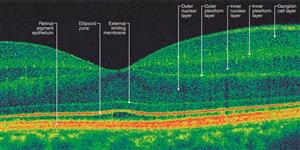Alzheimer’s Disease, Dementia and the Eye
Courtesy of the American Academy of Ophthalmology. Written By: Kate Rauch
Eyes and Brain Have Much in Common
The relationship between brain tissue and eye tissue is an area of intense interest for ophthalmologists and neurologists. The brain has a critical role in taking the visual information your eye gathers and putting it together into a picture that you can understand. And the optic nerve directly connects the brain to the back of the eye.
Research shows that diseases and conditions of the brain can also affect the eyes because the optic nerve and retina are actually brain tissue that extends outside the brain case. Alzheimer’s disease and dementia, which are caused by damage to brain cells, both appear to have effects on the retina.
We don’t yet have eye tests that can help us diagnose or understand dementia, but current research shows exciting potential. Studies show a clear relationship between brain tissue and eye tissue and point toward future areas of research.
Could We See Alzheimer’s Disease Through the Eye?
Alzheimer’s disease is a degenerative neural disease caused by an abnormal build-up of proteins in the brain that kills cells and damages connections between neurons. Common symptoms include memory loss, difficulty thinking, disorientation and other kinds of cognitive decline. Symptoms can also include vision problems, especially trouble with spatial relationships and depth perception. Some patients develop trouble reading, following moving objects, or have problems with contrast.
There are several kinds of dementia, though Alzheimer’s is the most common. It accounts for 60 to 80% of all dementia. Other types include vascular dementia—which is associated with stroke—dementia with Lewy bodies and frontal lobe dementia. Parkinson’s disease can also cause dementia, as does Huntington’s disease. Some people get mild cognitive impairment (MCI) in older age, which may or may not get worse with time. It can be an early stage of Alzheimer’s disease.
Right now, Alzheimer’s disease is diagnosed after a series of assessments and exams that rule out other things. These might include cognitive testing for memory and thinking, talking to family members, physical exams and brain imaging scans.
But none of these tests actually diagnose Alzheimer’s. Alzheimer’s disease can currently only be confirmed after death by examining brain tissue. The tests may help narrow down the type of dementia or rule out other conditions with similar symptoms.
The difficulty of diagnosing Alzheimer’s disease and other dementias is driving research on the eye-brain connection. What if a detailed look at the retina could help identify early-stage brain disease? It’s already known that eye exams can help diagnose systemic health issues like cardiovascular disease, risk factors for stroke, diabetes, high blood pressure, autoimmune diseases, sexually transmitted diseases and some cancers.
New Research Points In Promising Directions
A flurry of recent studies shows changes in the retina in people with Alzheimer’s or other forms of dementia. These are mostly small studies, but they’re setting the stage for more work. Most of these studies have shown changes in the individual layers of the retina or the blood flow within the eye.
Many of these retinal changes are found using a quick and common test called optical coherence tomography (OCT). Many ophthalmologists have the basic equipment to do this test in their office, since it’s used in evaluating several other eye diseases. But the full technology to do this kind of testing isn’t yet available.
Another recent study using a new imaging technique called fluorescence lifetime imaging ophthalmoscopy (FLIO) has measured a protein called beta-amyloid in the retina. This is one of the proteins that builds up in the brain of people with Alzheimer’s. Studies also indicate eye tissue changes in people with other brain diseases such as Creutzfeldt-Jacob (mad cow disease) and Parkinson’s disease.
For Patients, Continue Routine Eye Care
Though studies are encouraging, there isn’t enough information on the eye-brain connection yet to change anything for patients. If you’re worried about memory loss or dementia, talk to your family doctor or see a neurologist. If you have concerns about your vision or eyes, see an ophthalmologist.

